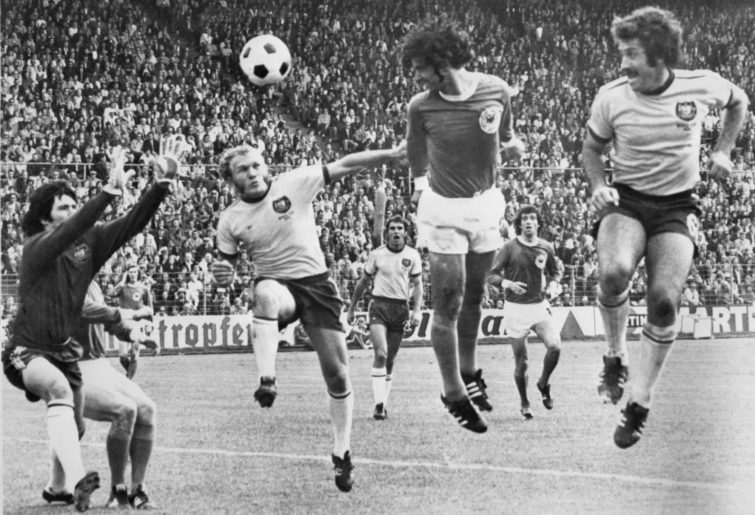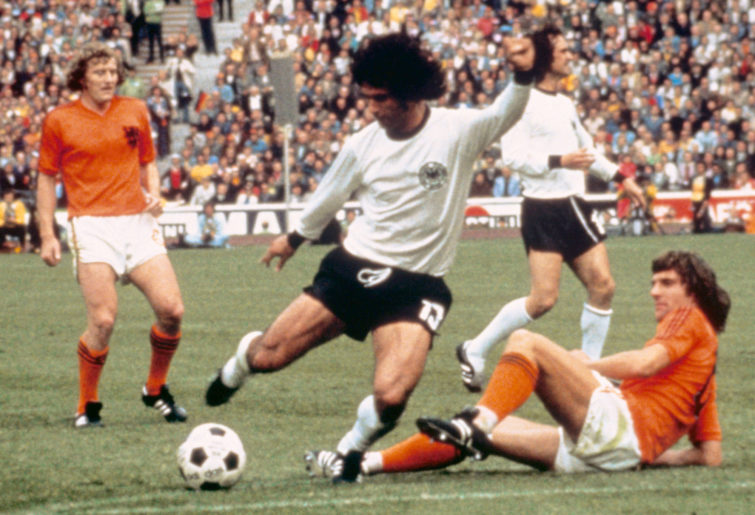WATCH: Manchester City can't believe their luck after missing first-half sitter of a tap-in
Not only did Erling Haaland's header hit the bar, but Bernardo Silva missed the rebound tap-in that came off his knee. Manchester City went…
Opinion
On the 15th of August the football world was informed of the sad passing of Bayern Munich and Germany legend Gerd Muller.
Muller had an ongoing battle with Alzheimer’s disease for a number of years, which eroded his health greatly.
While tributes to the great striker have flowed in the following days, his true prowess and ability is still little-known throughout the modern football fandom.
So just how good was he? In order to truly establish this, both his club and national career must each be looked at in isolation just to recognise just how spectacular he was.
He began his professional club career in 1963 at TSV 1861 Nordlingen, a small club located in the town of Nordlingen that played in the German lower leagues.
In his one and only season at the club he scored 31 goals and led the team to promotion. He was lauded for his finishing prowess and movement in the box despite his tender age of 18.
The following season he was recruited by Bayern Munich, who had just missed out on a spot in the newly formed Bundesliga to local rivals 1860 Munich.
A bitter taste was left in the mouth of the Bayern faithful from what they saw as an unfair omission, and many did not see Muller as the man to lead them to promotion.
He was criticised for his height, standing at just five foot nine, and he had a perceived overweight physique in an era when strikers were seen to be physically dominant.
Though this initial scepticism would be short lived as he scored 33 goals in just 26 games and led Bayern to promotion to the Bundesliga.
He would also form a formidable partnership with a young teammate called Franz Beckenbauer, with whom he’d experience great success for both club and country.

(Staff/AFP/Getty Images)
Bayern then finished third in their first Bundesliga season and won the DFB Pokal before beating Rangers in the European Cup Winners Cup the following season. This marked the start of an era for both Muller and Bayern.
In 1967-68 Bayern won the first league and cup double, with Muller being named the German football player of the year in 1967 as well as top scoring in both competitions.
Bayern went on to win the Bundesliga three more times across the next decade with Muller spearheading the attack and winning five more league golden boots. Though this era of dominance would not just extend to German football, but European football as well.
The Cup Winners Cup victory in 1967 was just a taste at European success for Muller, as Bayern went on to make semi-final appearances in the European Cup in both 1968 and 1972.
Though it would not be until 1974 until Muller won his first European cup, as his Bayern team beat Atletico Madrid 4-0. He top scored in the competition with eight goals, one of which came in the final.
Bayern went on to cement their European dominance by winning the European Cup the next two years, being the first team since Real Madrid to win three in a row.
On top of all the team achievements Muller was involved in across his 15 years at Bayern Munich, he also acquired a large collection of individual honours to match.
He was a seven-time Bundesliga top scorer and a four-time European Cup top scorer and also won German player of the year twice. Though this dwarfs in comparison to his accolades in the 1970 season, in which he won the Ballon d’Or as well as the European golden shoe.
His achievements however are not just limited to Bayern, as he had an equally if not more impressive national career with Germany.
Muller made his West Germany debut in 1966, though he would not become a regular feature in the team until after West Germany’s agonising defeat to England in the 1966 World Cup final.
By the time the 1970 World Cup rolled around, Muller had already scored 20 goals for West Germany in just 20 appearances, and this red-hot form continued into the tournament. He went on to score ten goals in just six appearances as West Germany was knocked out in the semi-final to Italy.
Naturally Muller walked away with the golden boot and was awarded the bronze ball as the third best player at the tournament.
His excellent goal-scoring form would only continue over the next four years as he came into the 1974 World Cup with 64 goals in just 55 appearances, which included a 1972 European Championship.

(Photo by Peter Robinson/EMPICS via Getty Images)
Despite the Euros win and the tournament being on home soil, West Germany came into the World Cup as underdogs due to Johan Cruyff and the presence of his ‘total football’ Netherlands side.
The Netherlands made it to the final with a perfect record, having scored 14 goals and conceding just one, whereas West Germany had a much bumpier ride to the final, which included a 1-0 loss in the group stage to rivals East Germany.
A Dutch win was viewed as inevitable prior to the game and looked to be proved correct as they took the lead in the second minute through a penalty.
However the Germans battled back with Muller scoring the winner to secure one of the biggest upsets in World Cup history.
The 1974 World Cup win is seen as one of Muller’s greatest achievements, but it would also be his last appearance for the national team due to a dispute post-game with West German officials.
He finished his international career with 68 goals in just 62 games, which to this day is the second best goals-to-game ratio for players with over 50 caps.
His record of most goals scored in World Cups stood for 32 years and his record as German top goal scorer stood for 40, though no one since has been able to score as efficiently as Muller.
Despite his untimely passing, Muller’s legend at both club and international level will live on for decades to come.
His striking skill set, movement in the box and of course his impressive trophy cabinet are unmatched throughout history and will cement him as one of the greatest if not the greatest striker of all time.